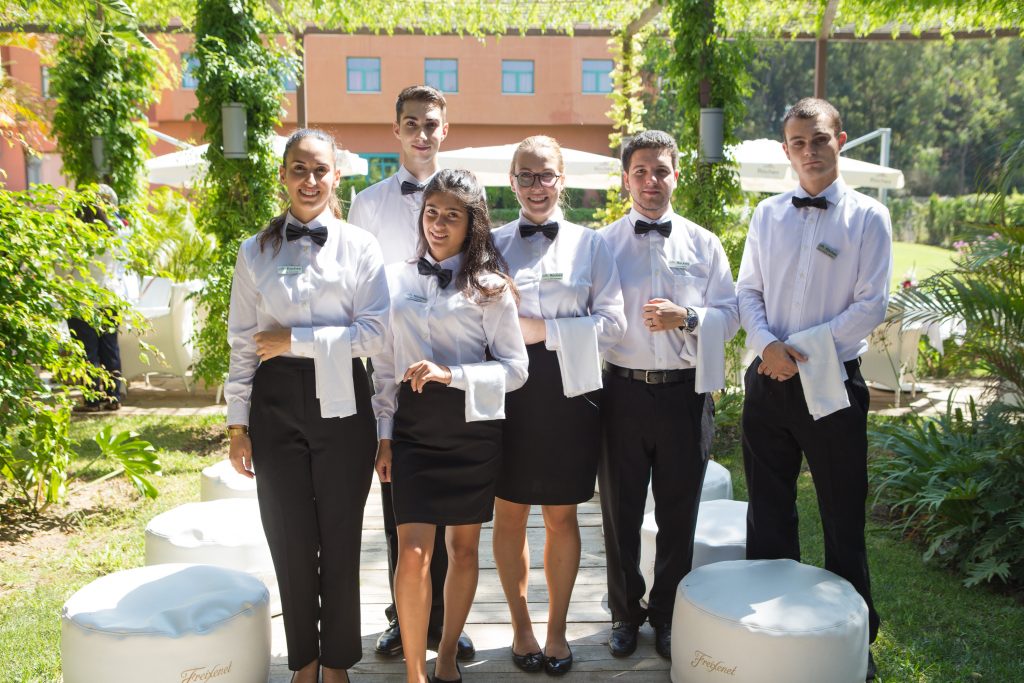Developing students’ soft skills is an important aspect of hospitality management education. From the outset, they are taught the fundamentals of communication and teamwork through experiential training in real-world scenarios, From there, Hospitality majors develop leadership qualities, emotional intelligence, and a solid work ethic – skills that are valued in any industry. In today’s competitive marketplace, soft skills are important assets on any hospitality professional’s CV if they wish to stand out. Dominating these essential people skills will open doors in hospitality and beyond. Here we highlight six important soft skills and explain how they can be applied in the hospitality industry as well as in other industries that rely on people-to-people relationships.
Leadership Qualities
Good leaders are decisive and exude integrity while knowing how to build relationships with their teams. They motivate others while encouraging positivity and creativity. Hotels and hospitality-related companies consist of many departments and functions that, while often independent of each other, all work towards the common goal of guest satisfaction. Therefore, they depend on effective leaders with people experience and the ability to successfully coordinate these complex operations. Hospitality Management majors are well suited for future leadership roles due in large part to the experiential nature of their studies and the need to delegate responsibilities in team environments.
Team Management

Successful team management involves forming bonds and gaining trust with staff in a way that brings out the best in them. One person could never run an establishment as complex as a hotel all on their own. It is therefore crucial that future managers learn early on how to delegate responsibilities, unify team members, be approachable, and always recognize both individual and group accomplishments.
Verbal Communications
Interpersonal communications are not all about your ability to convey a message one-way. Communication also involves listening to others and showing interest in what they have to say. Nowhere is this more apparent than in hospitality where attention to the guest’s needs and desires is paramount to ensuring they have a positive experience with your company. Additionally, as a manager, hospitality professionals will often need to address and diffuse issues with staff and guests, and this requires sound verbal communication skills that guide you not only on what to say but how and when to say it.
Emotional Intelligence
Knowing when to speak, remaining calm in tense situations, controlling one’s own emotions, and reading those of others around you defines your emotional intelligence while increasing your potential to succeed in the workplace. Emotional intelligence is also beneficial to building lasting relationships with both coworkers and customers alike. Working in hotel environments where communication with guests is an important aspect of the job provides the perfect combination for students of Hospitality Management to develop emotional intelligence skills that can be utilized in any professional environment where control and measured responses are crucial.
Adaptability

More now than ever, adaptability in the workplace is an essential tool for any professional. Hospitality-trained professionals are oftentimes more suited than others for this skill given their diverse, hands-on cross-training in various operations within the hotel and tourism industry. Learning from the ground up in practical, real-world settings, hospitality students learn to adapt quickly to changes from the outset. Maintaining a positive attitude and flexibility under unforeseen circumstances is an important ingredient in building a successful career in many fields.
Work Ethic
From the outset, hospitality professionals develop a strong work ethic by working in teams where each member is responsible for the achievements of the whole. A sense of responsibility and respect for each job, and a willingness to get one’s hands dirty, serves to motivate others through example. Hard work, passion, and commitment are highly valued traits in any job. Hospitality Management students begin developing these traits from day one. They put them into practice each day while studying at Les Roches and undertaking internships in hotels.



